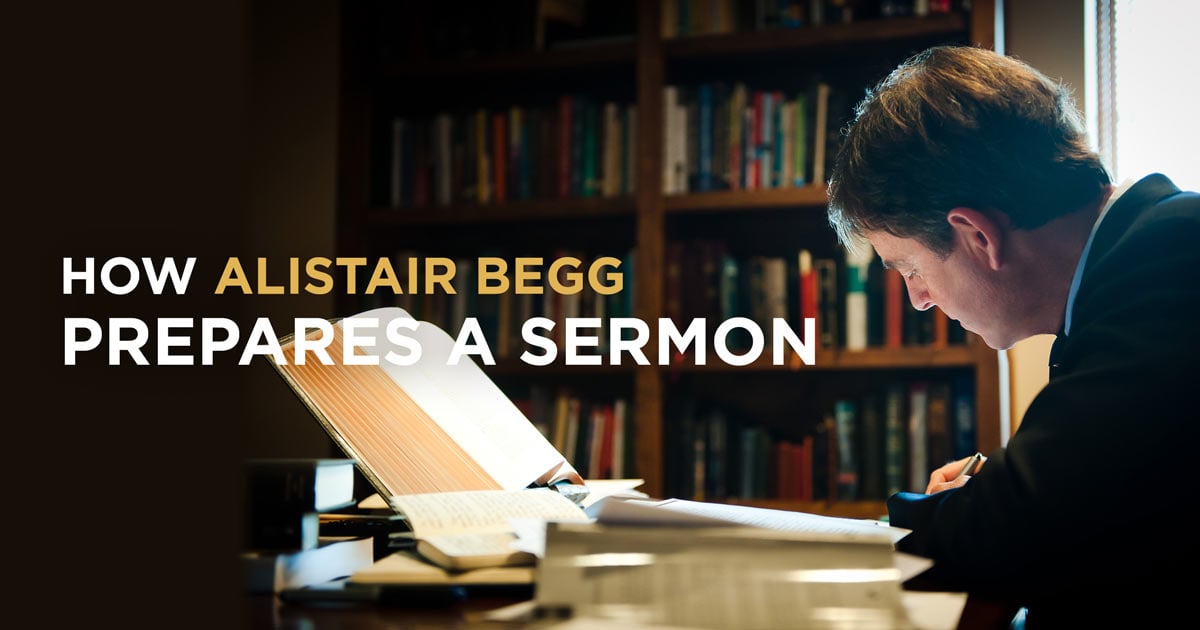
The following material was adapted from On Being a Pastor by Derek J. Prime and Alistair Begg (©2013). Published by Moody Publishers. www.MoodyPublishers.com. Used by permission.
Preparing a sermon or a talk is a very personal process, and the reason we (Alistair and Derek) share our own approach is that we have been helped over the years as we have asked others how they set about the task. Whatever our method, prayer and personal obedience to the Word of God must come first. The very spirit in which we prepare should express our dependence upon God and our personal willingness to be obedient to what He reveals to us to pass on to His people.
A danger when we first begin to preach is to try to say everything we have discovered about a subject or a passage! We then make what we say indigestible. Hours spent in preparation do not mean that we have to share all our thought processes with our hearers. Ruthless pruning ensures we are as clear and simple in our approach as possible. The mark of a good teacher is that what is difficult and complicated becomes simple to understand. We need to be selective in our use of what we have learned from a passage and to beware lest a mass of information obscures the actual message God wants us to convey. The benefit of systematic exposition of Scripture is that we touch upon subjects that otherwise might not be dealt with, but that God uses to bless people in a remarkable manner as they sit under the regular exposition of His Word.
Exposition is what we have in view, not imposition. It is more important to let the Scriptures guide us as to our subjects than for us to have a subject in mind and then try to find a Scripture upon which to latch what we want to say. One of the exciting features of a series of sermons on a subject, a character, or a Bible book is that God, in His gracious sovereignty, so regularly times the applicability of that exposition to the present needs of a congregation. Every shepherd and teacher will be able to recall instances of God using the systematic exposition of Scripture in remarkable ways.
I (Alistair) remain fascinated by the variety of approaches that preachers take in preparing their sermons. In our preparation as well as in our delivery we must “to our own selves be true.” When I am asked to summarize my method of preparation, I mention the following points, which I learned from the late Leith Samuel:
- Think yourself empty. As strange as it may sound, we must be careful to ensure that we do not avoid sound thinking. The temptation to respond emotionally to a passage (“This is how this makes me feel”) is not unique to our listeners. If we are to have thinking congregations it is incumbent upon us to be thinking pastors! We do not want to be uncertain by the time our study ends, but it is surely right and proper to begin with the perspective “I must know what this says, and I must learn what this means.”
- Read yourself full.
- Write yourself clear. Aside from the essential empowering of the Holy Spirit, if there is one single aspect of sermon preparation that I would want to emphasize, it is this. Freedom of delivery in the pulpit depends upon careful organization in the study. We may believe that we have a grasp of the text, only to stand up and discover that somewhere between our thinking and our speaking, things have gone badly awry. The missing link can usually be traced to the absence of putting our thoughts down clearly.
- Pray yourself hot. There is no chance of fire in the pews if there is an iceberg in the pulpit! Without prayer and communion with God during the preparation stages, the pulpit will be cold. In 1753, John Shaw reminded the incumbent pastor beginning his charge in Cambridge, Massachusetts, “All will be in vain, to no saving purpose, until God is pleased to give the increase. And in order to do this, God looks for their prayers to come up to His ears. A praying minister is the way to have a successful ministry.”1
- Be yourself, but don’t preach yourself. A good teacher, like John the Baptist, clears the way, declares the way, and then gets out of the way.
1 John Shaw, The Character of a Pastor According to God’s Heart (Morgan, PA.: Soli Deo Gloria, 1992), 10.
Topics: Begg's Blog, Articles
